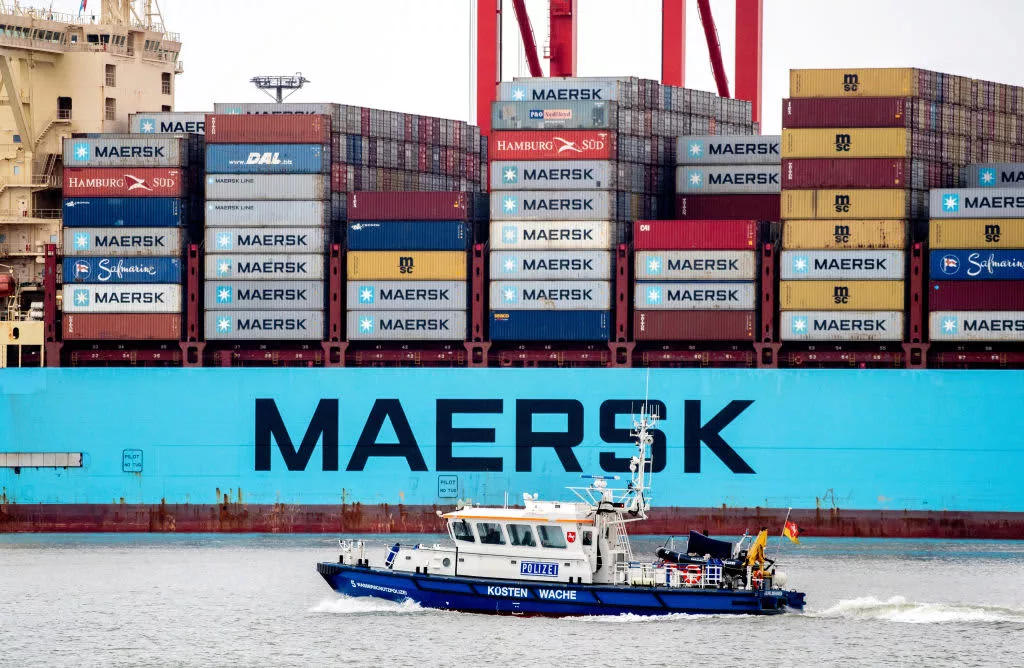Title: Shipping Giants Hapag-Lloyd and Maersk Pause Red Sea Travel Amidst Attacks by Houthi Militants
Introduction:
Shipping companies Hapag-Lloyd and Maersk have decided to temporarily halt their travel through the Red Sea and the Bab el-Mandeb Strait due to a series of attacks on their vessels by Iranian-backed Houthi militants from Yemen. This article discusses the reasons behind this decision, the impact on global trade, and the measures being taken to ensure the safety of seafarers.
Heading 1: Attacks on Shipping Giants Prompt Temporary Travel Pause
Heading 2: Maersk Diverts Ships Away from Red Sea
Heading 2: Hapag-Lloyd Pauses Container Ship Traffic through Red Sea
Maersk, the world’s second-largest container shipping company, has announced that it will divert its ships away from the Red Sea in response to the attacks. The Houthi militants, who support Hamas, have specifically targeted vessels headed for Israel. This decision by Maersk is aimed at ensuring the safety and security of its employees and seafarers in light of the alarming security situation in the southern Red Sea and Gulf of Aden.
Hapag-Lloyd, which controls about 7% of the global container ship fleet, has also decided to pause all container ship traffic through the Red Sea until further notice. The company will assess the situation and make a decision on resuming operations after Monday.
Heading 1: Significance of the Bab el-Mandeb Strait and Red Sea
Heading 2: Connection to Global Trade and Suez Canal
The Bab el-Mandeb Strait, located between the Horn of Africa and the Middle East, serves as a crucial waterway connecting the Red Sea to the Gulf of Aden and the Arabian Sea. It plays a vital role in facilitating global trade, including the transportation of container ships and exports of petroleum and natural gas from the Persian Gulf.
Approximately 12% of the world’s trade, which includes 30% of all global containers, passes through the Suez Canal, which feeds into the Red Sea and Bab el-Mandeb Strait. The recent incidents highlight the strategic importance of this route. The Suez Canal gained significant attention in March 2021 when the container ship Ever Given was stuck for six days, disrupting global trade.
Heading 1: ZIM Ocean Carrier Takes Alternative Route
Heading 2: Impact on Travel Time and Fuel Costs
To safeguard their vessels and crew amidst the threats by Houthi militants, Israel-based ocean carrier ZIM has rerouted its vessels to avoid the Arabian and Red Seas. Instead, they are traveling around the Cape of Good Hope in South Africa, adding 10 to 14 days of travel time to their journeys. This alternative route also incurs higher fuel costs due to the longer distance.
Heading 1: Calls for Action to Protect Seafarers
Heading 2: U.S. Government’s Response
In response to the attacks and escalating crisis, the World Shipping Council has expressed deep concern and called for decisive action to protect seafarers. They emphasize the fundamental right of freedom of navigation under international law.
The U.S. government has been engaged in discussions with countries of the Combined Maritime Forces to establish a maritime task force aimed at ensuring safe passage for ships in the Red Sea. U.S. Central Command, responsible for America’s military interests in the Middle East, has confirmed ongoing discussions.
Conclusion:
The decision by shipping giants Hapag-Lloyd and Maersk to pause their travel through the Red Sea and Bab el-Mandeb Strait reflects the growing concern over attacks by Houthi militants. This temporary measure aims to prioritize the safety and security of seafarers. The incidents highlight the significance of this strategic route for global trade and the need for international cooperation to protect freedom of navigation.


